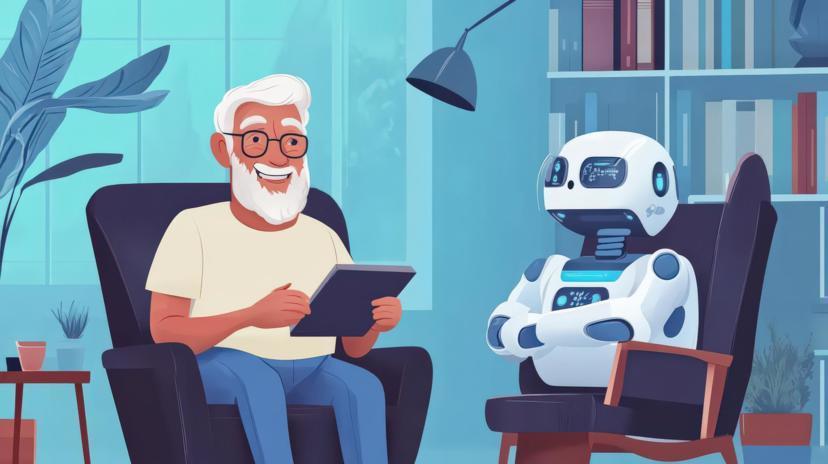Healthy Solutions: Making Life Better for Seniors with AI Chatbots

Jessica Robin is a top Medical Researcher in Enigma, Georgia. With a passion for the field and an unwavering commitment to their specialty, Jessica Robin is an expert in changing the lives of their patients for the better. Through their designated cause and expertise in the field, Jessica Robin is a prime example... more
There was a time when companionship was something you had to arrange. You'd make yourself a cup of tea, walk down the road, and, if you were lucky, find somebody who would be willing to listen to your views on the council's latest disastrous attempt at road maintenance. If that failed, you might manage a sentence or two from the postman, provided he wasn't in too much of a hurry. But now, well, things are different. Now, there are chatbots.
It reads like the script of a science fiction movie, and for those who still consider the microwave vaguely sinister, it will perhaps take some getting accustomed to. However, artificial intelligence—or AI, as the technologically inclined like to call it—has crept into everyday existence with surprisingly little fuss. And among its many uses, it seems to have found an unexpected calling: providing companionship, assistance, and even a bit of subtle scam detection for older people who, let's be honest, have spent quite enough of their lives being bothered by unwanted phone calls.
The Rise of the AI Companion
Of course, humans have always had their own ways of amusing themselves. There's television, though it seems to be all cooking shows and people yelling at one another about real estate these days. There's the crossword, but that requires a level of concentration that is not always present after lunch. And there's the ancient art of talking to oneself, which has been taboo for decades until AI chatbots came along and gave it new respectability.
SeniorTalk, for instance, offers what it calls an "AI companion for elderly people" that, unlike an intrusive neighbor or judgmental relative, is there to listen without interrupting or judging. If you've
had a conversation with someone who can't wait to share exactly what they think of your wallpaper selection before you've even completed the sentence, you'll understand the appeal. The 'AI for old people' project guarantees one-on-one chats that are specific to personal interests, so you can talk as long as you want about 1950s jazz, the heyday of Hollywood, or other niche interests without being rushed.
More Than a Bit of Chat: AI's Practical Uses for the Elderly
But it's more than a chat. AI has slipped into the more everyday areas of later life as well. There's scam detection, for a beginning, which, given the number of doubtful calls received by anyone over the age of 60, is no bad thing. The AI chatbot for elderly users has been trained to flag anything that even remotely has the whiff of a scam about it, such as an overprotective grandson who's read one too many cautionary tales online. It will not allow you to hand over your banking information to a courteous young fellow purporting to be from 'the electricity board' or send cash to a remote cousin you have never met but who, nonetheless, desperately requires immediate financial help.
A World Beyond Simple Assistants
Some, of course, will be sceptical. There's a generation that doesn't entirely trust escalators yet, let alone something as seemingly sentient as an AI assistant for elderly individuals. And good enough—if you've spent most of your life thinking robots were the stuff of science fiction, you might not be entirely thrilled at the idea of one taking an interest in your daily routine.
But these AI companions aren't the grim, robotic voices of dystopian nightmares. They don't bark orders or demand efficiency. They don't tut when you've forgotten where you put your glasses. No, they're there to provide a bit of structure, some conversation, and the occasional reminder that you'd meant to go for a walk this afternoon. AI for seniors is a service designed to help the elderly with their daily tasks while combatting loneliness.
Breaking the Loneliness Cycle
Loneliness, after all, is no small thing. It sneaks up on you. One day, you’re surrounded by family, colleagues, or friends, and then, quite suddenly, you’re not. The people who once dropped by are busy with their own lives. The phone rings less often. The days stretch out, and conversations become something that happen in your head rather than out loud.
AI for seniors won't replace the warmth of human connection, but it can fill some of the quieter moments. It can ask how you're doing. It can remind you that you used to enjoy listening to a certain song or reading a certain book. It can even, in its own way, provide a little reassurance—someone (or something) that's always there, always listening, always ready with a welcoming word.
The Future of AI and Aging
It's easy to consign AI to the land of something distant, something that belongs in tech companies and laboratories, not in living rooms and kitchens. But it's already here, insidiously creeping into the fringes of daily life. The toaster no longer just toasts—it calculates the optimum level of crispiness. The television doesn't just show programmes—it suggests what you might like to watch next. And now, there are AI elderly chatbots that offer a listening ear, a bit of
To some, it will be a novelty. To others, a utility. And to most, it will be something in between—a bit of companionship, a bit of reassurance, a voice that's always there if you need it. Which, if you think about it, is not a bad thing at all.
advice, and a way to navigate a world that's increasingly digital as we get older.









